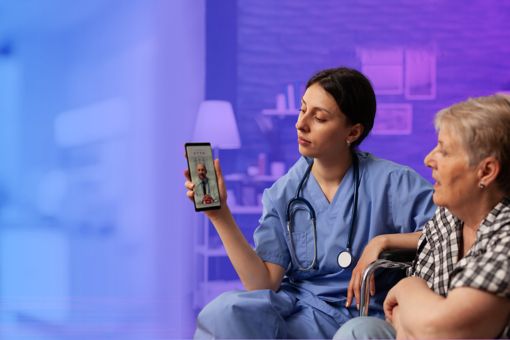For any organisation, investment in technology is critical – but it’s only through the digital skills and competencies of their people as they utilise the technology that real value can be created.
To see digital skills thrive, it’s essential to embrace a culture of learning. This is at its best when it happens through collaboration between colleagues and teams across a workforce, driving up enthusiasm, confidence, and levels of innovation. It’s not only important working with the people around you physically but having similar relationships across boundaries.
One organisation that has exemplified this is Digital Health and Care Wales (DHCW). It has an award-winning approach to upskilling the health and care data analytics workforce in Wales, leveraging the National Data Resource (NDR) Programme. A core part of the programme is bringing together national data sets from across health and social care in Wales while enabling Advanced Analytics professionals to utilise the data to generate insight, innovate and ultimately improve care.


Our organisation thrives on collaboration as a natural strength, giving us a unique edge. However, we understand the importance of nurturing and sustaining this cooperative spirit to ensure we are constantly innovating and learning.

The challenge: Complex digital requirements across a varied skills base
DHCW had an ambition to upskill the health and care workforce as part of its national Data Strategy. There was a lack of consistency in skills and capabilities across the analytical workforce. Some might be experts in data science but lacked the confidence to effectively communicate findings with senior stakeholders. In contrast, others were keen to utilise the data available to them, but lacked foundational skills in formatting, modelling and analysis to generate the insights they were looking for. Chris Habberley from the Advanced Analytics team at DHCW said:


If we can inspire people to want to do more with data, they’ll realise the need to learn more with data, too. Learning isn't and shouldn’t just be a one-off activity, it should be part of our everyday culture.

The solution: Transformative learning and building a culture of continuous improvement
DHCW partnered with KPMG to embed a comprehensive learning programme that supports the capability and confidence of analysts across Wales. The Analytics Learning Programme (ALP) focuses on developing both key analytical competencies (such as problem solving, active listening, visualisation etc) as well as technical skills (Python, Power BI and other key applications), delivered through a range of learning modes – including classroom-based sessions, practical technical labs, work on real problems, and individual online study to back up and reinforce learnings. Implementing ALP has been a key initiative to improve the capability of analysts across health and social care in Wales, driven by the Advanced Analytics team within the NDR Programme, hosted by DHCW.
The programme team itself takes a collaborative approach to delivery, practicing what it teaches to participants. For example, trainers are sourced from across different NHS organisations and leadership work across departments to source new participants. All with the aim to improve learning and culture.
Having been delivered to three cohorts already, it continues to adapt with the needs of the organisation and the cooperative delivery approach highlights the collaborative nature that has been instilled with the learning.
The six-month programme begins with a competency assessment to understand the current strengths and development areas of participants, not only from their own perspective but from those they work closely with. We also capture the areas they are interested in or their personal ambitions. Over the subsequent months, they then build and develop their technical and professional skills in an engaging, multi-faceted programme, leading up to 12-week group project hackathon.


From a learning perspective, it’s about having both the taught and applied components that gives the programme its ‘superpower.’ It means it’s not just a training programme, but one where the learnings become deeply embedded.

The hackathon brings all the learnings together and puts the participants’ skills to the test in a safe environment, where they can continue to learn from one another. Small teams seek to co-develop proof of concept solutions to real challenges faced on the ground. The use cases put forward for the programme are specially selected based on their potential impact, as well as their relevance to the core skills covered in the programme.
Analysts work together to develop a solution, as they would in real life, – and then present it in an engaging and insightful way to impress the judges, as they seek to be crowned winners. These judges are senior leaders from multiple organisations across Wales and are able to understand the significance of the solutions presented in the context of strategic challenges being faced by their organisations (senior leaders in their organisation as well as use case owners).


A key part of the programme’s success is the pro-active participation of the learners. They are hungry to learn, work collaboratively and have been given the flexibility to be creative. Senior sponsorship has helped drive and maintain momentum.

A number of highly promising proof of concepts have been developed through the programme’s hackathons with the potential to improve real outcomes, including:
Welsh Blood Service – Plasma Collection Reporting and Analysis
This tool improves understanding of plasma donations among other types, providing operational insights into the habits of returning donors and the performance of different collection sites.
NHS Wales Delivery Unit - National Hip Fracture KPIs
A solution put into operation following the ALP hackathon is that this dashboard extracts data from web pages using C# code to automate a labour-intensive process, reducing the time and effort needed to source, present, and distribute NHFD KPI data.
The programme has led to external awards too: recognised for collaboration at the Analysis in Government (AiG) Awards in 2022 and shortlisted for the Data IQ Awards in 2023 for Best Data Academy or Skills Development Programme alongside the likes of Coca Cola and Marks & Spencer.
The path ahead: Expanding the benefits
Now, in continuing partnership with KPMG, the Advanced Analytics team is continuing to deliver ALP to an ever-increasing number of participants, as well as developing trainers and champions of analytics for the future. The team continues to involve alumni, giving the chance for participants to give back and support others on a similar journey to theirs.
"The more we deliver this training the more we are learning that the desire is far greater than anticipated. Because we have been delivering the training, we ourselves have learnt the opportunities and issues around addressing skills shortages, particularly in data and digital."
- Chris Habberley
Through the delivery of the programme, DHCW has seen a significant increase in skill levels of analysts across Wales in core competencies, equipping analysts to drive data-informed decision making and ultimately empowering them to play a part in improving patient outcomes.
The value of the Analytics Learning Programme hasn’t just been the new skills or the increased skills, it’s also been the transformation of the culture to one of learning and collaboration. That’s where many of the hurdles have been before. That’s why we’re eager to continue growing the programme.
Watch to find out how we delivered immersive learning experiences:
Bridging the skills gap in health and care in Wales
Connect with us
- Find office locations kpmg.findOfficeLocations
- kpmg.emailUs
- Social media @ KPMG kpmg.socialMedia
Save, Curate and Share
Save what resonates, curate a library of information, and share content with your network of contacts.


